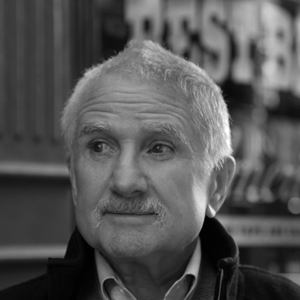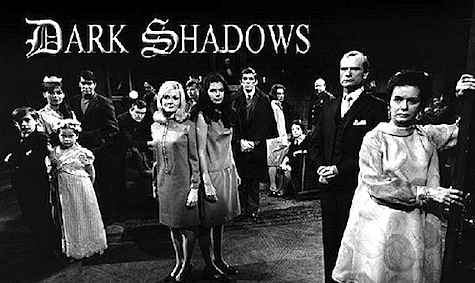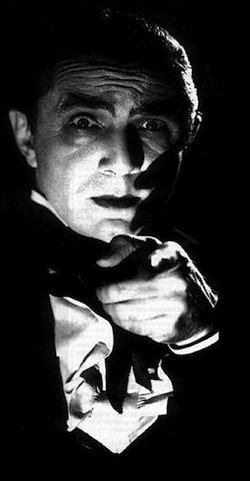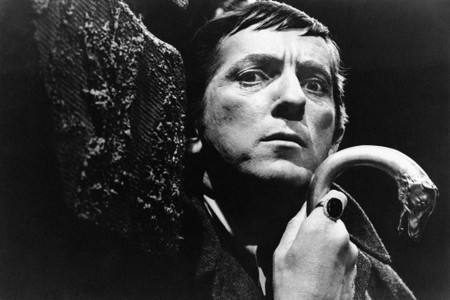If I were able to time travel 100 years into the future and find a descendant of mine writing about the never-ending popularity of vampires, I wouldn’t be surprised one bit. There’s nothing trendy about vampires because they are, in some ways, our greatest metaphor; able to stand in for nearly whatever our storytellers want to throw at them. Though according to Joseph Caldwell—one of the original writers on Dark Shadows—vampires are “a metaphor for compulsive sex!” And if that doesn’t explain the immortal popularity of the fanged ones, I don’t know what does!
Recently, I was lucky enough to sit down with Caldwell and discuss the origins of Barnabas Collins, how to write a good soap opera, and why the motto in the Dark Shadows writers’ room was “Stop me before I suck more!”
Though Caldwell is known almost exclusively for the creation of the vampire Barnabas Collins, it wasn’t until the 211th episode of Dark Shadows that the character was actually introduced. While not credited for his writing on the show, Joseph Caldwell and a fellow writer Ron Sproat were actually responsible for the formation of Barnabas after producer Dan Curtis gave them the directive that he wanted “a vampire for the kids for the summer.” And while Curtis favored grisly happenings on the show, Caldwell felt like giving the vampire a conscience would give the writers “something always to play against,” and prevent the character from simply becoming a “serial killer.” Thus, the sympathetic reluctant vampire Barnabas Collins was born, played expertly by Jonathan Frid.
 “The teenagers went nuts when we brought Jonathan on. That’s when the show took off.” Caldwell says excitedly, “Because here we have a guy who is compelled by his nature to do what he has to do, to kill people, but he doesn’t like it. He doesn’t want to do it. But he needs it. He has to have it, because it’s a metaphor for compulsive sex! We were up to 20 million at some point!” Caldwell believes the universal sympathy for Barnabas extends past just the sexual metaphorthough, going so far as to call his character “almost Byronic” in nature. Barnabas is sympathetic, but he’s not remotely weak. The number of people he smacked around with his awesome cane were innumerable!
“The teenagers went nuts when we brought Jonathan on. That’s when the show took off.” Caldwell says excitedly, “Because here we have a guy who is compelled by his nature to do what he has to do, to kill people, but he doesn’t like it. He doesn’t want to do it. But he needs it. He has to have it, because it’s a metaphor for compulsive sex! We were up to 20 million at some point!” Caldwell believes the universal sympathy for Barnabas extends past just the sexual metaphorthough, going so far as to call his character “almost Byronic” in nature. Barnabas is sympathetic, but he’s not remotely weak. The number of people he smacked around with his awesome cane were innumerable!
“It was a wonderful cane!” Caldwell squeals, “It was rubberized, but it looked very real.”
A playwright, a novelist, and a teacher, Caldwell is probably the only genre soap opera writer who is also the recipient of the Rome Prize for literature. His most popular series of novels began with the hilarious The Pig Did It, which inspired several sequels. He is quick to joke that “… being the Joe Caldwell who wrote for Dark Shadows got me far more cred with my students at Columbia than being the Joe Caldwell who won the Rome Prize for literature!” And yet, it’s in Caldwell’s more serious, literary tendencies where one finds the origins of the tremendous impact Caldwell and Dark Shadows had on how vampires could be depicted.
Always resistant to the requests for more gore or murder, Caldwell firmly believes that writing characters and concepts as fanciful as vampires often requires a great deal of “restraint.”
“Writing is a process of revelation, but also restraint,” he says, “I like to present things to my imagination and see if there’s something exciting there. If there’s not, and it’s all intellect, then it’s not worth it.” Caldwell, in this way, is not a genre writer who wonders “what if?” and then follows a story to its conceptual roots, but instead a writer of deeply human tales that must engage the reader/viewer emotional level, well before any high concept exploration can take place. Interestingly, Caldwell felt very strongly about incorporating solid storylines from classic literature and mashing them up with the Barnabas plot lines on Dark Shadows.

Whether borrowing from The Picture of Dorian Gray or Rebecca, the appropriation of certain literary themes helped steer Dark Shadows into believable territory; which is no small feat considering we’re talking about a daily soap opera about a vampire who lives in Maine! However, the literary themes and plots which Caldwell and Sprout borrowed did not go unnoticed. Caldwell relates a story about a fan who wrote in complaining “you don’t have a group of writers there, you’ve got a den of thieves!” Caldwell cops to this, but stresses the importance of keeping everything happening on Dark Shadows not only literary, but also as literal as possible, despite being aware of the big metaphors.
“We never wanted to play to the metaphor, but instead, play the vampire straight. We felt the audience wouldn’t connect with Barnabas if he didn’t seem like a real person, with real problems…we were always trying to figure out a way to make the stories better, more engaging, more ordinary. In a way, we almost wanted to make you forget he was a vampire sometimes…or as we used to say; ‘stop me before I suck more!’”

In expressing our mutual love of the Bela Lugosi’s portrayal of Dracula, Joe let me in on one of the more common salutations around the Dark Shadows writers’ room during his tenure. The wonderful Italian phrase, tante bella cose (which roughly translates to wishing someone “all the beautiful things”) was transmuted into vampire-speak by Caldwell and his compatriots to tante Bela Lugosi! Which I suppose translates into…oh whatever, you get it.
So the next time you watch some old school Dark Shadows (most of which is streaming on Netflix!) you’ll hopefully have a larger understand of not only the depth and care that went into this creaky old show, but also the human heart of one of its fine writers.
Tante Bela Lugosi, Joe Caldwell!
[Interview with Joseph Caldwell was conducted at the Open Road Media offices in New York City on March 7th, 2013]
Ryan Britt is a staff writer for Tor.com.










